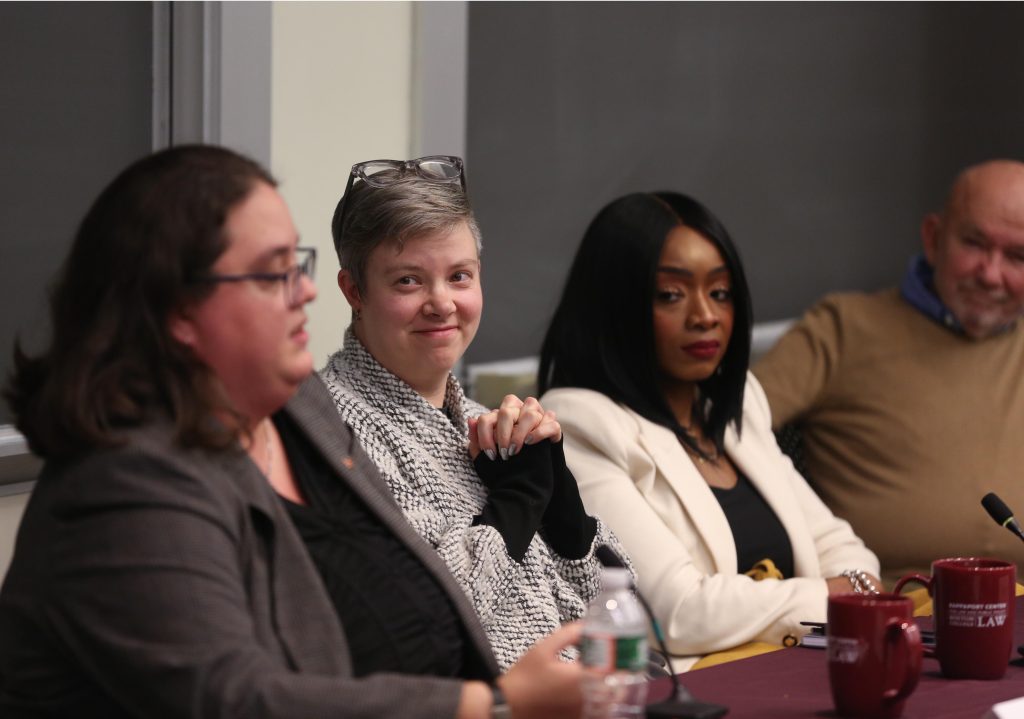The Rappaport Center for Law and Public Policy assembled a group of ardent LGBTQ+ lawyers and advocates on October 18 to discuss the latest developments in transgender rights at the state and federal level.
The conversation was moderated by legal scholar and activist John Ward, the first openly gay male lawyer in Boston and founder of GLAD, the Gay and Lesbian Advocates and Defenders (known today as GLBTQ Legal Advocates & Defenders). Ward’s bona fides as a defender of LGBTQ+ are undeniable: In 1995, he also became the first openly gay male lawyer to argue before the US Supreme Court in the landmark case Hurley v. Irish-American Gay, Lesbian, and Bisexual Group of Boston.
Ward, who is also an adjunct professor at BC Law, was joined by three other champions of LGBTQ+ rights: Shaplaie Brooks, executive director of the Massachusetts Commission on LGBTQ Youth; attorney Heron Greenesmith, deputy director of policy at the Transgender Law Center; and attorney Casey Pick, director of law and policy at the Trevor Project, the foremost suicide prevention and crisis intervention organization aimed primarily at LGBTQ+ youth.
According to Pick, in the last year alone, the Trevor Project has opposed nearly 650 cases of proposed legislation targeting LGBTQ+ people around the country. Attempts to curtail transgender rights have become increasingly common over the last decade.
Greenesmith identified the rise of religious fundamentalism on the far-right as the root cause of the latest push to discriminate against transgender people. “We’ve been watching as the Christian right amasses power and political connections in order to—in their words— gain ‘dominion’ over certain areas of public life in the United States,” they said. One key element of this shift has been the promulgation of gender essentialism, the idea that traditional gender roles are rooted in biology. That theoretical framework necessarily denies the transgender community’s right to exist, according to Greenesmith.
“If you free the most marginalized person in the room, you’ll free everyone.”
Shaplaie Brooks, executive director of the Massachusetts Commission on LGBTQ Youth
“It’s been wave after wave after wave of bathroom bills, bans on transgender athletes participating in school sports, and gender-affirming care bans,” Pick said. “This is not grassroots politics, it’s cheap astroturfing that has a tangible, negative impact on the youth of the country. Anybody who’s played on AstroTurf knows that even those cheap fields can really hurt.”
Even relatively minor gestures of support and affirmation can make all the difference, according to Pick. “In schools that include LGBTQ concerns and issues in the curriculum, where there are books on the shelves that tell our community’s stories, we see a reduction in suicide rates to the tune of 20 percent,” she said.
Brooks stressed the importance of centering intersectionality in conversations about LGBTQ+ issues and policy. “When we think about LGBTQ youth, we often think about the Black, indigenous, and other people of color. But there are other, additional intersecting identities to keep in mind, such as refugee or immigrant status,” she said. “How can we make sure that Black and brown people feel protected, that [by living openly as transgender] they’re not just putting an ‘X’ marker on their ID as another way to be discriminated against? If you free the most marginalized person in the room, you’ll free everyone.”
The panelists also shared the critical need to care for oneself while engaging in such emotionally and legally difficult work.
Photograph by Reba Saldanha


